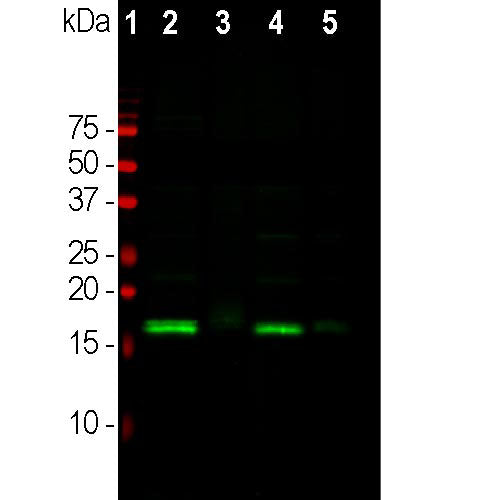

EnCor Biotechnology
Chicken Polyclonal Antibody to α-Synuclein, Cat# CPCA-SNCA
Description
The CPCA-SNCA antibody recognizes full length human and rodent α-synuclein specifically both in western blots and in immunocytochemical experiments and is a good marker of synapses on rodents, including transgenic mice. We document that the antibody works well not only for western blotting, IF and ICC but also on formalin fixed paraffin embedded sections, select the "Additional Data" for this data. We also market a mouse monoclonal to α-synuclein MCA-2A7. The MCA-2A7 epitope is in the region 61-95 which corresponding to the central “non-amyloid beta component of Alzheimer’s disease amyloid”, a proteolytic fragment of α-synuclein which co-purified with Alzheimer's amyloid. This monoclonal antibody has been used as an ELISA capture reagent capable of detecting α-synuclein in human plasma in combination with a polyclonal antibody such as CPCA-SNCA (8).
- Cell Structure Marker
- Cell Type Marker
- Chicken Polyclonal Antibodies
- Cytoskeletal Marker
- Immunohistochemistry Verified
- Pathology Related Marker
Add a short description for this tabbed section
| Immunogen: | Full length recombinant human protein expressed in and purified from E. coli |
| HGNC Name: | SNCA |
| UniProt: | P37840 |
| Molecular Weight: | 15kDa by SDS-PAGE |
| Host: | Chicken |
| Isotype: | IgY |
| Species Cross-Reactivity: | Human, rat, mouse, cow, pig, horse |
| RRID: | AB_2572385 |
| Format: | Immunogen affinity purified antibody at 1mg/mL in 50% PBS, 50% glycerol plus 5mM NaN3 |
| Applications: | WB, IF/ICC, IHC |
| Recommended Dilutions: | WB: 1:2,000. IF/ICC and IHC: 1:2,000-1:5,000. |
| Storage: | Store at 4°C, for longer term store at -20°C. Stable for 12 months from date of receipt. |
α-synuclein is a member of the synuclein protein family, the other two members being β and γ synuclein, each protein being coded for by a distinct but related gene. α-synuclein was originally isolated as a major synaptic vesicle associated protein from the electric organ of the fish Torpedo (1), and direct homologues of α-synuclein are found in all vertebrates. Later work connected α-synuclein expression with several human brain pathologies, so that it is a major component of the Lewy bodies of Parkinson’s disease (2). Point mutations of α-synuclein proved to be causative of some forms of familial Parkinson’s disease (3-5). One genetic cause of early onset Parkinson’s disease is duplication or triplication of one of the α-synuclein genes leading to excess production of the protein (6,7). α-synuclein is also found in the Lewy bodies of patients with diffuse Lewy body disease and inclusions in glial cells in the brains of patients with multiple system atrophy and amyotrophic lateral sclerosis. α-synuclein is normally heavily expressed in brain and appears to be localized primarily to presynaptic regions, though not with a typical synaptic vesicle distribution pattern.

Chromogenic immunostaining of a formalin fixed paraffin embedded human cerebellum section with chicken pAb to α-synuclein, CPCA-SNCA, dilution 1:5,000, detected in DAB (brown) following the ABC method with citrate buffer retrieval at pH=6.0. Hematoxylin (blue) was used as the counterstain. The α-synuclein protein is concentrated in synapses, in particular highlighting the glomeruli synapses in the granule layer and those on Purkinje dendrites in the molecular layer. Mouse select image for larger view.
Additional References
7. Culvenor, J.G. et al. Non-Abeta component of Alzheimer’s disease amyloid (NAC) revisited: NAC and alpha-synuclein are not associated with Abeta amyloid. Am. J. Pathol. 155:1173-81 (1999).
8. Ibanez, P. et al. Causal relation between alpha-synuclein gene duplication and familial Parkinson’s disease. Lancet 364:1169-71 (2004).
9. Dyson, HJ. and Wright, PE. Intrinsically unstructured proteins and their functions. Nat. Rev. Mol. Cell. Biol. 6:197-208 (2005).
10. Cookson MR. Alpha-Synuclein and neuronal cell death. Mol. Neurodeg. 4:9 (2009).
1. Maroteaux L, Campanelli JT, Scheller RH. Synuclein: a neuron-specific protein localized to the nucleus and presynaptic nerve terminal. J. Neurosci. 8:2804-15 (1988).
2. Lavedan C. The Synuclein Family. Genome Research 8:871-80 (1998).
3. Polymeropoulos, MH et al. Mutation in the alpha-synuclein gene identified in families with Parkinson’s disease. Science 276:2045-7 (1997).
4. Kruger, R et al. Ala30-to-Pro mutation in the gene encoding alpha-synuclein in Parkinson’s disease. Nature Genet. 18:106-8 (1998).
5. Chartier-Harlin, M-C. et al. Alpha-synuclein locus duplication as a cause of familial Parkinson’s disease. Lancet 364:1167-9 (2004).
6. Singleton, AB.et al. Alpha-synuclein locus triplication causes Parkinson’s disease. Science 302:841 (2003).
7. Ibanez, P. et al. Causal relation between alpha-synuclein gene duplication and familial Parkinson’s disease. Lancet 364:1169-71 (2004).
8. Tinsley RD, et al. Sensitive and specific detection of α-synuclein in human plasma. J. Neurosci. Res. 88:2693-700 (2010).
Add a short description for this tabbed section






